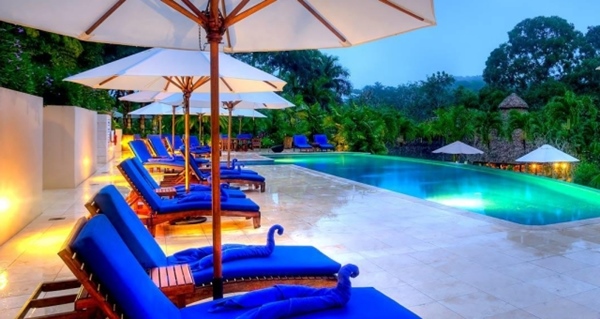Coinciding with the United Nations International Year of Sustainable Tourism Development, the five winners of the 2017 National Geographic World Legacy Awards were announced this week during an awards ceremony held at the Palais am Funkturm as part of ITB Berlin.
The World Legacy Awards, a partnership between National Geographic and ITB Berlin, showcase the leading travel and tourism companies, organizations and destinations — ranging from large resorts to small eco-lodges and from wildlife conservancies to entire countries — that are driving the sustainable tourism transformation of the global travel industry.
More than 100 entries, representing 45 countries across six continents, were submitted for these prestigious travel awards. An international panel of 26 judges coordinated by Costas Christ, a internationally recognized sustainable tourism expert and award-winning National Geographic travel writer, scored each entry according to globally recognized sustainable tourism criteria. All 15 finalists underwent a rigorous on-site inspection.
Christ said, “Sustainable tourism development is crucial for the future of travel and for the planet. The time is now for action on a global scale. The travel and tourism industry is based on promoting and selling culture and nature holiday experiences and as such, needs to take a bigger role in protecting the very resources that their business depends upon. When planned and managed well, tourism can be a tremendous force for good – from saving endangered species to heritage preservation and poverty alleviation. The World Legacy Award winners and finalists are demonstrating the way forward to a brighter travel future for people and the planet.”
“National Geographic stands for exploration, conservation and stellar storytelling. World Legacy Awards celebrate the people, places and experiences that exemplify our mission in the global travel industry,” said George Stone, National Geographic Travel editor-in-chief. “We are proud to honor these leaders in sustainability who represent the future in travel and inspire the explorer in all of us.”
The 2017 National Geographic World Legacy Awards winners and finalists are:
EARTH CHANGERS: recognizing cutting-edge leadership in environmentally friendly business practices and green technology, from renewable energy and water conservation to zero-waste systems and carbon-emission reduction.
WINNER: Cayuga Collection, Costa Rica and Nicaragua — This innovative hotel collection combines state-of-the art sustainability with experiential travel at eight unique properties in Central America. Reduction and monitoring of energy, water, waste, composting, recycling, and other earth-friendly initiatives inspire staff and guests to make green practices part of their own lives. Innovative practices also include eliminating plastic waste (at Cayuga, even drinking straws are reusable bamboo), and guests join popular behind-the-scene tours to learn how sustainability directly touches their vacation experience.
FINALISTS:
-Finch Bay Galapagos Hotel, Ecuador
-ITC Hotels, India
SENSE OF PLACE: recognizing excellence in enhancing sense of place and authenticity, including support for the protection of historical monuments, archaeological sites, cultural events, indigenous heritage and artistic traditions.
WINNER: City of Santa Fe, New Mexico, USA — If American pioneers from more than a century ago were to visit Santa Fe’s central plaza today, they would recognize it instantly. The oldest state capital in America considers safeguarding its rich heritage a duty and a passion. The historic downtown and surrounding area protect archaeological sites and cultural authenticity, including the Santa Fe Indian Market, now almost 100 years old and still going strong. Santa Fe’s annual festivals and events place Native American, Spanish, and Anglo heritage front and center, while strong sustainability initiatives also bring the past into the future.
FINALISTS:
-Adventure Canada, Canada
-Awamaki, Peru
CONSERVING THE NATURAL WORLD: Recognizing outstanding support for the preservation of nature, restoring natural habitat and protecting rare and endangered species, whether on land or in the oceans.
WINNER: North Island, Seychelles — With the Seychelles Islands known as the Galapagos of the East, this luxury eco-resort’s innovative Noah’s Ark project has successfully reintroduced some of the Seychelles’ rarest and most endangered species back to nature as part of their restoration of native habitat on the former plantation island. Biologists on site monitor all aspects of the island’s ecology, contributing to greater global understanding of migration patterns, sea temperatures, and the impacts of climate change in one of the world’s biodiversity hotspots.
FINALISTS:
-Mark Thornton Safaris, Tanzania
-Misool, Indonesia
ENGAGING COMMUNITIES: recognizing direct and tangible economic and social benefits that improve local livelihoods, including training and capacity building, fair wages and benefits, community development, health care and education.
WINNER: The Lodge at Chaa Creek, Belize — Belize’s pioneer jungle lodge demonstrates that putting local people first benefits employees, villagers, and its own bottom line. The Lodge provides economic benefits to community projects across the nation, directing 10 percent of all room revenue to support social and environmental programs. They offer annual training and workshops to promote career development, and sponsor an Environmental Outreach Program, a free Eco-Kids summer camp, and scholarships and internships for local students.
FINALISTS:
-Andaman Discoveries, Thailand
-Chambok Community Based Eco-Tourism/Mlup Baitong, Cambodia
DESTINATION LEADERSHIP: recognizing destination leadership, including cities, provinces, states, countries and regions that are demonstrating environmental best practices, protection of cultural and natural heritage, benefits to local communities and educating travelers on the principles of sustainability.
WINNER: Slovenian Tourist Board, Slovenia — with nearly 60 percent of its land protected, the country of Slovenia has successfully laid the foundation to become one of the world’s most sustainable destinations. The Tourist Board unifies all stewardship initiatives through its Green Scheme, which sets guidelines and provides tools for monitoring sustainability progress, instilling a culture of continual improvement in the country’s tourism efforts based upon benefiting local communities, protecting cultural heritage and saving nature, including revitalizing rural areas and creating authentic travel experiences for visitors.
Finalists:
-The Riverwind Foundation/Jackson Hole Chamber of Commerce, Wyoming, USA
-Segera Retreat, Kenya


